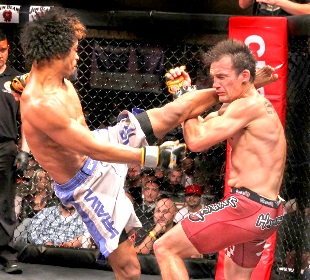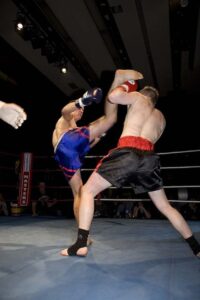
In the world of UFC and MMA, a knockout (KO) is a dramatic and decisive ending to a fight.
But what exactly happens to a fighter’s body and brain during this intense moment?
Contents
- What Happens To UFC/MMA Fighters When They’re Knocked Out?
- Can Being Knocked Out Kill You?
- How Long Does a Person Stay Unconscious After Being Knocked Out?
- What Happens When You Wake Up From Being Knocked Out?
- Why Do People Go Stiff When They Get Knocked Out?
- Why Do People Shake When They Get Knocked Out?
- Can You Feel Pain When You’re Knocked Out?
What Happens To UFC/MMA Fighters When They’re Knocked Out?
When a fighter receives a powerful blow to the head, the sudden motion can cause a complex chain of events in the brain that leads to a knockout:
- Rapid Acceleration and Deceleration: The force of impact causes the brain to move rapidly within the skull, first accelerating and then decelerating quickly. This motion can stretch and damage nerve fibers and disrupt the delicate balance of neurotransmitters, which are chemicals that transmit signals in the brain.
- Neuronal Disruption: The rapid movement of the brain can cause a temporary disruption in the normal electrical activity of neurons, the cells that transmit information in the brain. This disruption can lead to a sudden, temporary loss of function in areas of the brain responsible for consciousness and motor control.
- Cerebral Concussion: The impact can cause a concussion, a type of traumatic brain injury characterized by a temporary loss of brain function. Symptoms of a concussion can include loss of consciousness, confusion, dizziness, and memory loss.
- Blood Flow Changes: The impact can also cause changes in blood flow to the brain. A sudden drop in blood pressure or constriction of blood vessels can reduce the supply of oxygen and nutrients to the brain, further impairing its function.
- Chemical Imbalance: The trauma can lead to a release of various chemicals and ions within the brain, disrupting the normal chemical balance. This imbalance can affect the function of neurons and lead to a temporary loss of consciousness.
- Recovery: The brain has a remarkable ability to recover from this temporary disruption. As the neurons stabilize and the chemical balance is restored, the fighter gradually regains consciousness. However, the duration of unconsciousness can vary depending on the severity of the impact and the individual’s physiological response.
It’s important to note that while a knockout might seem like a quick and simple event, it’s a complex physiological process that can have serious health implications.
This is why the safety and health of fighters are of utmost importance in combat sports like UFC and MMA.
Can Being Knocked Out Kill You?
Yes, being knocked out can potentially lead to death, although such cases are rare in MMA, and nonexistent in the UFC.
The forceful impact that causes a knockout can result in serious injuries, some of which can be life-threatening.
Ways a Knockout Can Lead to Death:
- Traumatic Brain Injury (TBI): Severe TBIs, such as brain hemorrhages or diffuse axonal injuries, can be fatal if not treated promptly.
- Secondary Impact Syndrome: Suffering a second head injury shortly after a knockout can cause rapid and severe brain swelling, which can be deadly.
- Neck and Spinal Injuries: An awkward fall after a knockout can lead to serious spinal injuries, which in severe cases can result in paralysis or death.
- Heart Arrhythmias: A forceful blow to the chest can induce heart arrhythmias, potentially leading to sudden cardiac death.
- Pre-existing Conditions: Fighters with underlying medical issues like aneurysms or vascular abnormalities are at a higher risk of fatal outcomes following a knockout.
Common Risks of Being Knocked Out:
While the risk of death from a knockout is low, there are more common risks associated with being knocked out, including:
- Concussions: The most immediate risk is a concussion, a type of TBI that can have short- and long-term effects on brain function.
- Post-Concussion Syndrome: Some individuals may experience persistent symptoms after a concussion, including headaches, dizziness, and cognitive difficulties.
- Chronic Traumatic Encephalopathy (CTE): Repeated knockouts and concussions over time can increase the risk of developing CTE, a degenerative brain disease.
- Psychological Impact: Experiencing a knockout can have mental and emotional effects, such as anxiety, depression, and a decrease in confidence.
To minimize the risks associated with knockouts, UFC/MMA organizations enforce safety protocols, medical screenings, and provide immediate medical attention to fighters.
The presence of trained medical personnel and strict enforcement of rules help ensure the safety and well-being of fighters.
How Long Does a Person Stay Unconscious After Being Knocked Out?
The duration of unconsciousness after a knockout varies and can range from a few seconds to several minutes.
On average, a person might remain unconscious for 10 to 20 seconds following a knockout. However, this can vary significantly based on several factors.
Factors Influencing Duration:
- Severity of Impact: A more forceful blow can result in a longer period of unconsciousness.
- Location of Impact: Strikes to specific areas of the head, like the chin or jaw, can cause a quicker loss of consciousness due to the acceleration of the brain inside the skull.
- Individual Differences: Each person’s brain and body respond differently to trauma, so recovery time can vary from one fighter to another.
- Previous Injuries: Fighters with a history of concussions or knockouts may experience longer periods of unconsciousness.
Recovery Process:
After a knockout, the brain begins a natural recovery process. As the neurons stabilize and the chemical balance is restored, the fighter gradually regains consciousness.
Medical personnel will assess the fighter for signs of concussion or more serious injuries and provide appropriate care.
What Happens When You Wake Up From Being Knocked Out?
Waking up from a knockout can be a disorienting experience. The process of regaining consciousness and recovering from a knockout involves several stages:
- Initial Confusion: Upon waking up, the fighter may feel confused and disoriented. They might not remember what happened or where they are. This is why UFC fighters often ask their coaches what happened or what they were hit with.
- Physical Symptoms: Common physical symptoms upon regaining consciousness include headache, dizziness, nausea, and a feeling of grogginess. There may also be visual disturbances like blurred vision.
- Cognitive and Emotional Effects: The fighter may experience difficulty concentrating, memory problems, and mood swings. Anxiety and depression are not uncommon after a traumatic event like a knockout.
- Medical Evaluation: Medical personnel will assess the fighter for signs of concussion or other injuries. This may include checking vital signs, conducting a neurological exam, and asking questions to assess cognitive function.
- Recovery Period: Depending on the severity of the knockout and any accompanying injuries, the fighter may need to rest and undergo a period of observation. This is to ensure that there are no delayed symptoms or complications.
- Gradual Return to Activity: If a concussion is diagnosed, the fighter will typically follow a protocol for a gradual return to physical and cognitive activities. This may involve rest, followed by light exercise, and eventually, a return to training and competition.
- Follow-Up Care: Follow-up appointments may be necessary to monitor the fighter’s recovery and ensure that symptoms do not worsen.
It’s important to note that the experience of waking up from a knockout can vary from person to person.
Some fighters may recover quickly with minimal symptoms, while others may experience longer-lasting effects.
The priority is always the safety and health of the fighter, with a focus on preventing further injury and ensuring a full recovery.
Why Do People Go Stiff When They Get Knocked Out?
When a person gets knocked out, they may sometimes exhibit a phenomenon known as “fencing response” or “posturing,” where their arms and legs may go stiff, often resembling a fencer’s stance.
This reaction is an involuntary movement and is considered a telltale sign of a concussion or traumatic brain injury (TBI).
Reasons for Stiffness:
- Brainstem Activation: The sudden impact on the head can cause a brief activation of the brainstem, the part of the brain that controls basic body functions. This activation can result in stiffening of the limbs.
- Neurological Response: The stiffness is believed to be a neurological response to the brain trying to protect itself and stabilize the body after the trauma.
- Loss of Muscle Control: A knockout causes a temporary loss of consciousness and muscle control. As the body falls to the ground, the muscles can stiffen or spasm, leading to the observed rigidity.
- Fencing Response: Specifically, the fencing response is characterized by the extension of one arm and the flexion of the other, resembling a fencer’s pose. It is thought to be a primitive reflex that occurs in response to a sudden loss of equilibrium.
Significance:
The presence of stiffness or posturing after a knockout is an important indicator for medical personnel.
It suggests that the individual has experienced a significant head impact and may have a concussion or more severe brain injury. Immediate medical assessment and monitoring are crucial to ensure proper care and recovery.
In summary, the stiffness observed when a person gets knocked out is a neurological response to the trauma.
It’s a sign of a potential concussion or brain injury and requires prompt medical attention to address any underlying issues.
Why Do People Shake When They Get Knocked Out?
When a person gets knocked out, they may exhibit shaking or convulsions, a phenomenon that can be alarming to witness. This shaking is usually a result of the brain’s response to the trauma and isn’t necessarily indicative of a seizure.
Reasons for Shaking:
- Neurological Disruption: A knockout involves a sudden disruption in the brain’s normal electrical activity. This disruption can cause involuntary muscle contractions, leading to shaking or twitching.
- Brainstem Activation: The brainstem, which controls basic body functions, can be briefly activated during a knockout. This activation can result in abnormal motor responses, including shaking.
- Release of Stress Hormones: The body’s response to the trauma of a knockout includes the release of stress hormones like adrenaline. These hormones can cause a fight-or-flight response, which may manifest as shaking.
- Post-Concussive Symptoms: Shaking can be a part of post-concussive symptoms, a collection of physical, cognitive, and emotional symptoms that can occur after a concussion.
Differentiating from Seizures:
While the shaking observed after a knockout can resemble a seizure, it’s typically not the same as an epileptic seizure.
However, in some cases, a severe head injury can trigger a seizure. Medical evaluation is essential to differentiate between post-traumatic shaking and a seizure.
Medical Attention:
Any instance of shaking after a knockout should be taken seriously. Medical personnel should assess the individual for potential head injuries, including concussions or more severe brain trauma. Monitoring and appropriate care are crucial for recovery.
In summary, shaking after a knockout is a result of the brain’s response to the trauma and is usually a temporary condition.
However, it warrants immediate medical attention to rule out more serious injuries and ensure proper treatment.
Can You Feel Pain When You’re Knocked Out?
When a person is knocked out, they’re in a state of unconsciousness and typically don’t feel pain during that time.
The loss of consciousness means that the brain isn’t actively processing sensory information, including pain signals.
Understanding Pain Perception:
- Conscious Awareness: Pain is a subjective experience that requires conscious awareness to be felt. When a person is unconscious, their brain is not in a state to perceive or interpret pain signals.
- Temporary Insensitivity: During the period of unconsciousness following a knockout, the individual is temporarily insensitive to pain due to the disruption in brain function.
Upon Regaining Consciousness:
While pain may not be felt during the actual knockout, it’s common for individuals to experience pain once they regain consciousness.
This can include headaches, soreness, or pain from injuries sustained during the knockout or fall.




